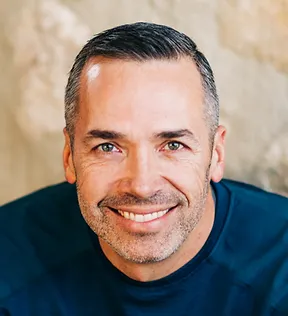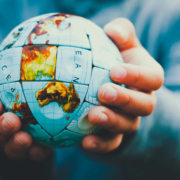How to Change the World
An Antidote to Apathy and Despair in an Age of Doom and Gloom
NOTE: This post originally appeared as an episode on my podcast, Andrew Petty is Dying. You can listen now with the media player below, or just read on…
If environmental armageddon doesn’t get us first, then a hostile nation’s plans for global domination will. Maybe the Republicans will sink the ship and all hands will be lost. Or maybe it’ll be the Democrats doing. What about AI–the potential for hyper-intelligent machines to take over the world and eradicate or enslave humanity? You thought COVID was tough? Just wait until the next super virus is unleashed by nameless, faceless, malevolent forces plotting our demise even as we speak.
Take your pick. There are no shortage of dire, doom and gloom scenarios to choose from these days. And the media and the internet serve up heaping quantities of it onto our psychological plates if we get in line for the 24/7 buffet.
I’m NOT saying, BTW, that there aren’t genuine reasons to be concerned about the state of the world. There are–and, there always have been. In the modern digital age, though, it’s possible to be aware of most of the challenges facing the world–or, at least, the existing portrayals of those challenges–and to be aware of them most of the time. That’s infinitely more knowledge and awareness than any one of us can hold well in our hearts and minds or possibly act upon.
And if we’re not careful, it can lead us to despair, despondency, and inaction.
Where does that leave us, then? What CAN we do? Good questions.
How do we change the world?
It’s Simple, Actually
I’m not going to bury the lead here. Let’s get right to the point.
To change the world, simply be the best “you” that you can possibly be.
Profoundly simple.
And FAR from easy.
If it was easy, more of us would embrace it and live it out.
It’s also far from a new idea. “Be the change you want to see in the world” is a statement derived from ideas that Gandhi put forth. As is “if you want to change the world, go home and love your family”–that one derived from Mother Teresa’s way of thinking. Today, in his book 12 Rules for Life: An Antidote to Chaos, Jordan Peterson sounds a similar note when he exhorts us all to “get our own house in perfect order” before we criticize the world or, by extrapolation, try to change the whole world.
It’s not a new idea, but it seems to be one that needs to be revived in our hearts and minds these days. We forget.
And we get swept up in the myriad of massive global concerns and take our eye off the ball right in front of us–the only ball that is really ours to carry. The ball of our One and Only Life, our unique path, and the purposes we alone can accomplish along that path.
We need to return to this simple idea and double-down on it in our own lives. As Natalie Niksa said in the previous episode, “we’ve lost our way because of all the shiny objects.” And in returning to this priority, we’ll revitalize our personal power, passion, and purpose and reduce our sense of paralysis and powerlessness in the face of all of the world’s woes.
Then, we can really get to work, right where we are, with what we have.
Breaking It Down
But what does it mean to “be the best you that you can possibly be,” and how does that actually change the world?
It means taking radical responsibility for yourself.
It means working your ass off to discover and express your unique self as fully as you can and bring your unique gifts into the world. It means dreaming the dreams that exist only within your heart and doing your damndest to fulfill them. It means doing the work to become the person you were made to be and live the life you were made to live. It means working your ass off to be the best spouse, partner, parent, neighbor, and employee, employer, or entrepreneur that you can be. It means dragging yourself over the finish line of your life utterly depleted AND utterly satisfied because you left it all out on the field.
For some, those efforts will yield global recognition and impact. For others of us, our efforts will only ever be known among those closest to us.
Guess what? The scope and scale of our impact is irrelevant and, frankly, none of our business.
It’s not even knowable, in fact. We have no way of knowing how much of a difference our life will make–now, and in the years and generations to come. Our lives ripple into eternity, just like those before us ripple into ours.
Keep It Positive
Make no mistake, though: There’s no such thing as a neutral or no-impact life.
We don’t get to control IF our life will make an impact or know how much of an impact we ultimately make, but we do get to influence what KIND of impact we’ll make.
Will it be negative because we shrank back, didn’t take full responsibility for our One and Only life, and failed to show up–and our absence was a loss for those who needed us to show up? Or will it be positive–not because we showed up perfectly all the time, but rather because we did our very best to simply show up, to bring the best of ourselves to this fleeting life, day in and day out?
Carl Jung said that the greatest burden a child can take into adulthood is the unlived life of their parent.
In a slightly sillier context but with no less relevance, in the Lego movie Ninjago, Lloyd the good ninja tells his dad, the movie’s arch villain, that he ruined his life. To which his dad, Lord Garmadon, replies, scoffingly,
“How could I ruin your life? I wasn’t even there.”
But How Does It Change the World?
If all of that at least makes a dent in understanding HOW to “be the best you that you can possibly be,” then that leaves the question of how it actually changes the world.
When we take responsibility for being the best versions of ourselves that we can possibly be, then we change ourselves. When we change ourselves, we change our world–the little part of the world that we call our own. Our family life changes, our work life changes, our community life changes. Then, as our world changes, by definition the world changes as the ripples move outward from us at the epicenter.
Change your life…change your world…change the world.
That, my friends, is how we change the world.
Buckle Up, Buttercup
The good news is that it’s so simple. Our primary focus becomes simply evolving ourselves. As I said at the beginning, though, it’s far from easy. There’s no journey more challenging. But there’s also no journey more completely satisfying and worthwhile. And if you’re looking for more purpose and meaning, this journey will fill that cup to overflowing.
So buckle up, buttercup, and get to work becoming the best you that you can possibly be.
And remember, you are going to die. But you’re not dead yet. So get after it!

I Can Help
Maybe you’re thinking something like, “how do I know if I’m becoming the best me that I can be? I’m not even sure who I am to start with.” The good news is that who you are, the person you were made to be, and the life you were made to live are discoverable. I can help you with that.
Find me on Facebook, Instagram, or LinkedIn, visit my website, or email me.
BTW, this post pairs well with episode 036 of my podcast, The Global Fish Pond Crisis, because it essentially offers a solution to the Global Fish Pond Crisis. If you haven’t checked out that episode, and this one was meaningful to you, then I encourage you to do so.
Follow Andrew Petty is Dying & Leave a Review
Apple Podcasts | Spotify | Google Podcasts | Stitcher
If You Liked This Post, I Recommend These APiD Episodes, Too…
- Ep. 014 | Dare to Dream Again: The Antidote to a Mediocre Life
- Ep. 016 | The Question That Changes Everything: The Go-to Tool for Living the Life You Were Made to Live
- Ep. 022 | Tune Out to Tune In: Hearing & Heeding Your Inner Voice in a World Full of Noise
- Ep. 025 | The Contentment Conundrum: Cracking the Code
- Ep. 029 | Dragon Slayer: One Man’s Tale of Heroic Life Renovation
- Ep. 035 | Build Your Personal Owner’s Manual: Understand Yourself Better, Enjoy Yourself More, and Live the Life You were Made to Live


